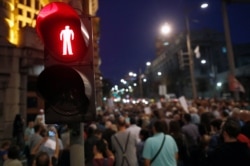The executive producer of Serbia's privately owned N1TV channel says the nation's president is to blame for a recent campaign of harassment targeting the broadcaster and journalists throughout the country.
On Monday, two masked men tossed hundreds of leaflets over a fence surrounding the broadcaster's Belgrade facility, with messages such as "Goodbye Republic of Serbia, N1 Welcome to Luxembourg," a reference to N1TV's Luxembourg-headquartered parent company, Adria News.
The flyers made reference to N1TV as being "TV-CIA" and "not paying taxes in Serbia." The suggestions of foreign control on the flyers are also criticisms frequently leveled at N1TV by President Aleksandar Vucic.
Neither N1TV nor Adria News receive U.S. government funding.
"The epicenter that creates a negative image of N1TV is on Andric Square," said Igor Bozic, N1TV's executive producer, referring to the physical location of the Serbian president's office. "I have no doubt that it is the presidency of Serbia."
The Vucic government denies targeting N1TV or any other reporters. Last week, Vucic's media adviser Suzana Vasiljevic told VOA that Serbians enjoy a free press, and that neither Vucic nor his officials incriminate or harass journalists.
However, free press advocates say the N1TV intimidation campaign has been singled out for its alleged bias toward Kosovo, which proclaimed its independence from Serbia in February 2008, but is not recognized by Belgrade.
Calling Vucic's government especially sensitive to criticism, Bozic said a series of events meant to intimidate reporters are a direct result of rhetoric by high-level Serbian officials known for referring to N1TV as "American television" and "CIA-N1," a reference to U.S. intelligence.
The independent Association of Serbian Journalists says that 89 incidents of threats or assaults on journalists have been recorded this year.
For example, in February, following months of harassing letters, Bozic said N1TV's Belgrade headquarters received a letter purportedly sent by a Serbian war veterans' association that directly threatened the lives of staff and their families.
"Do you have families … you're killing our children and grandchildren, and are unaware that if the destruction happens, your building will be the first to be blown up, and you may lose your dearest," N1's English-language website quoted the letter as saying. "That's why we, the veterans, warn you not to play with anyone's destiny, because your fate is in our hands."
The veteran's group denies writing the letter.
What's causing the harassment?
"Every campaign is coming from the president of Serbia, this is absolutely clear," Bozic said. "All the statements, all the information, unofficial and official. You can see it clearly in the tabloids, how the president's opinions are perpetuated by news outlets that are faithful to him."
N1TV regularly covers anti-government protests in Serbia. Like other members of the Adria News network of regional broadcasters, which has outlets in Croatia and Bosnia-Herzegovina, N1TV is also a CNN affiliate.
Monday's leaflet dump by the masked men sparked free press demonstrations outside of N1TV's Belgrade office, where some carried banners reading "journalists against phantoms."
Organized by the local Group for Media Freedom, demonstrators called on the government and President Vucic to stop violence against journalists.
"I strongly denounce any attempt or action that could endanger journalists' safety," Harlem Desir, media freedom representative at the Organization for Security and Co-operation in Europe (OSCE), said in a prepared statement. "Targeting media professionals with the intent of presenting them as foreign mercenaries is a dangerous and unacceptable behavior, and must be met with condemnation and effective prosecution."
The OSCE representative also welcomed the Serbian police's swift response to the leafletting incident and urged them to identify and bring the perpetrators to justice as soon as possible.
In December 2018, the house of investigative journalist Milan Jovanovic, a reporter for independent news website Zig Info, was set ablaze after an assailant threw a gasoline-based explosive through a garage window, and then fired upon Jovanovic and his wife as they tried to escape the burning home.
Police later arrested three people for leading the attack, including Dragoljub Simonovic, a municipal official and local branch chief of Vucic's Serbian Progressive Party.
Since 2013, news media watchdog Reporters Without Borders has lowered Serbia's press freedom ranking from 63 to 90 on scale of the 180 countries surveyed.
This story originated in VOA's Serbian Service. Some information is from RFE.





